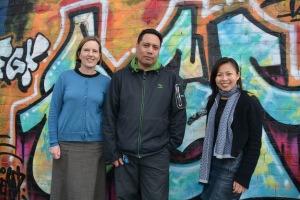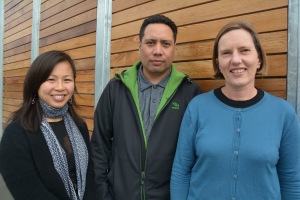
So we have presented ourselves in front of a government and private sector audience on our Demo Day 8 July.
We dug deep into the problem of employers struggling to provide the required information to support their employees’ Work Visa applications. We proposed to re-design the Employer Supplementary Form using simple language and provide in-context help, such as through videos, templates, FAQs and real-time customer support.
We discussed this approach with Immigration NZ and proposed a 4 month pilot to further prototype the solution concept. They said while they liked the idea of re-designing forms with customers at the centre, it was not the right time for Immigration NZ to progress this work. This is due to the focus on the Immigration NZ change programme, Vision 2015.
We have documented our learnings to share with Immigration NZ. We have recommended Immigration NZ take forward our learnings and look into taking an end to end forms process project in the next Accelerator. We have also recommended government to adopt the lean start-up methodology more widely for problem-solving.
The Good
- Our pitch went well on the Accelerator Demo Day. We had a great introduction from Bruce Robertson from Hospitality NZ. It was surreal to show what we have done in front of 150 people!
- People have shown great interests in our solution concept 🙂
- Celebrating our last day on the Accelerator by going out for Yum Cha with our colleagues from the Accelerator and BizDojo.
The Bad
- It’s always sad to leave, especially after such an intense experience with such highs and lows.
The Ugly
- No ugly for this week, yay!
There is no immediate future for EasyComply
Today we packed up from the BizDojo. We cleaned our whiteboards, cleared our desks and sorted through papers. It gave us space to reflect on this phase and prepare for what lies ahead. Each of us would like to use some of what we’ve learnt in whatever we do next, and carry on some of the energy and momentum from the Accelerator. We will miss the buzz and the excitement from the BizDojo. We will miss our colleagues from the other teams, and we plan to keep in touch.
Thank yous
We leave the Accelerator with a feeling of gratitude – gratitude for the experience of what was the Accelerator, and for all the people who have helped and taught us along the way. We would like to do a big shout out to:
- The people that we have spoken to from business and government, especially businesses from the tourism and hospitality sectors and Immigration NZ.
- Immigration NZ for providing us with two meaty problems to solve, and giving us the freedom to explore them
- R9 for establishing the first Government Accelerator with Creative HQ
- Creative HQ for their methodologies, drive, enthusiasm and support along with Boost New Media and Strategy Design
- Our colleagues on the other Accelerator projects for their fun and humour and perseverance in doing the right thing.
Quote of the week
Suki – “Feel the discomfort and lean into it.”
Julian – “Great work team.”
Victoria – “Lost for words.”
